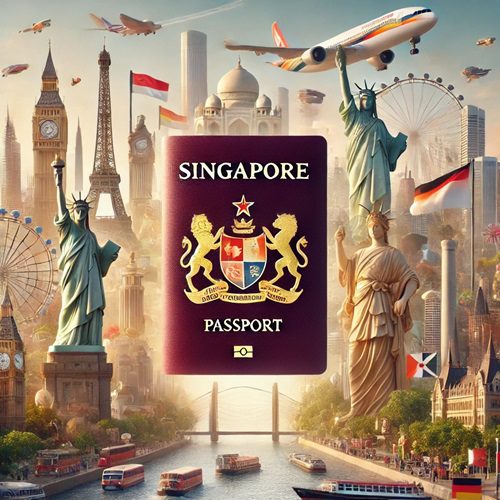 Singapore has reclaimed its position as the world’s most powerful passport in the latest Henley Passport Index, published today. The city-state’s passport now grants visa-free access to 195 destinations out of 227 globally, setting a new record. This achievement propels Singapore ahead of France, Germany, Italy, Japan, and Spain, which now share the second spot with access to 192 destinations.
Singapore has reclaimed its position as the world’s most powerful passport in the latest Henley Passport Index, published today. The city-state’s passport now grants visa-free access to 195 destinations out of 227 globally, setting a new record. This achievement propels Singapore ahead of France, Germany, Italy, Japan, and Spain, which now share the second spot with access to 192 destinations.
Dr. Christian H. Kaelin, Chairman of Henley & Partners and the inventor of the passport index concept, highlighted the global trend towards increased travel freedom over the past two decades. “The global average of visa-free destinations has nearly doubled from 58 in 2006 to 111 in 2024. However, the gap between the most and least mobile citizens is wider than ever,” Kaelin commented.
The Henley Passport Index is based on exclusive data from the International Air Transport Association (IATA). This year’s rankings show the UK holding fourth place alongside Belgium, Denmark, New Zealand, Norway, and Switzerland, with access to 190 destinations. However, the US continues declining, dropping to eighth place with 186 destinations.
Afghanistan remains the world’s weakest passport, with visa-free access to only 26 countries, the lowest in the index’s 19-year history. This stark contrast emphasizes the significant disparity in global mobility.
UAE’s Remarkable Ascent
The UAE has made a notable entry into the Top 10, rising from 62nd to 9th place since the index’s inception in 2006. This leap is attributed to strategic efforts by the Emirati government to enhance its global presence in business, tourism, and investment. Dr. Juerg Steffen, CEO of Henley & Partners, stated, “Countries with higher visa-free scores often enjoy greater economic prosperity, increased foreign direct investment, and robust international trade relationships.”
China and Ukraine are among the top climbers, with China moving from 83rd to 59th place and Ukraine from 53rd to 30th over the past decade. Conversely, Venezuela has experienced the most significant decline, falling from 25th to 42nd position due to ongoing political and economic turmoil.
Challenges for African Nations
New research in the Henley Global Mobility Report highlights African nations’ challenges in obtaining Schengen visas. African applicants have a rejection rate of 30%, significantly higher than the global average of 10%. This disparity is often attributed to economic conditions and perceived security concerns.
Prof. Mehari Taddele Maru, Adjunct Professor at the European University Institute, argues that European migration policies are influenced by national identity politics, leading to higher rejection rates for African applicants. “Africans face lower passport power, higher visa rejection rates, and limited economic mobility, exacerbating existing inequalities,” he noted.
The Importance of Openness
The Henley Openness Index, which measures countries’ openness to foreign nationals, reveals that small island nations and African states are the most welcoming. Singapore stands out for its high transparency, granting visa-free access to 164 nationalities, compared to 93 for France, Germany, Italy, and Spain, and 70 for Japan.
Despite having high visa-free access for its citizens, the US ranks low on openness, allowing visa-free entry to only 45 nationalities. This disparity has implications for global mobility and international relations.
Economic Impact
The Henley Global Mobility Report also examines the relationship between travel freedom and economic prosperity. Andrew Amoils, Head of Research for New World Wealth, notes that visa-free travel is crucial for international wealth and business mobility. Cities like Shenzhen, Hangzhou, and Bengaluru, experiencing rapid growth in millionaire populations, highlight the importance of travel freedom for economic success.
As global mobility continues to evolve, the Henley Passport Index remains a vital tool for understanding the dynamics of travel freedom and its impact on global prosperity.
Written by: Michelle Warner



















